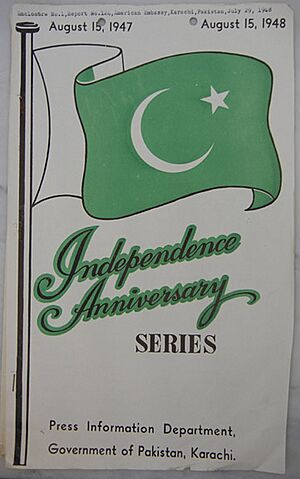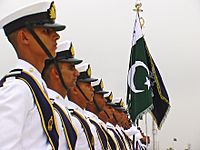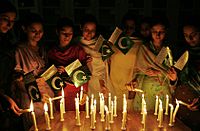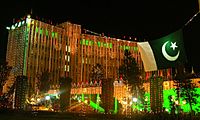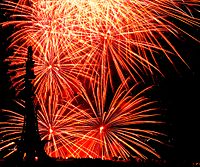Independence Day (Pakistan) facts for kids
Quick facts for kids Independence Day of Pakistan |
|
|---|---|
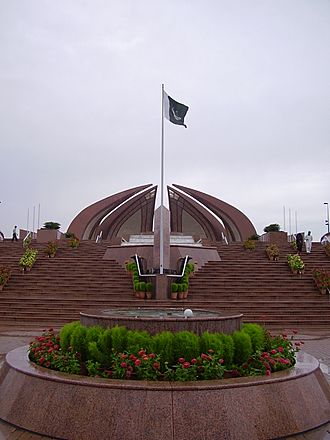
The flag of Pakistan hoisted at the mount of the Pakistan Monument in Islamabad
|
|
| Official name | Yāum-e-Āzādi یومِ آزادی |
| Observed by | Pakistan |
| Type | National |
| Significance | Commemorates the independence of Pakistan |
| Celebrations | Flag hoisting, parades, award ceremonies, singing patriotic songs and the national anthem, speeches by the President and Prime Minister, entertainment and cultural programmes |
| Date | 14 August |
| Next time | 14 August 2026 |
| Frequency | Annual |
| First time | 14 August 1947 |
| Related to | Pakistan Day |
Independence Day (Urdu: یومِ آزادی; Yāum-e-Āzādi) is a special national holiday in Pakistan. It is celebrated every year on 14 August. This day remembers when Pakistan became an independent country in August 1947. Before this, the area was part of the British Raj, which was ruled by the British Empire.
Pakistan was created because of the Pakistan Movement. This movement wanted an independent Muslim state in the northern parts of British India. Muhammad Ali Jinnah led this movement with the All-India Muslim League. Pakistan was formed when the Indian Independence Act 1947 was passed. This act split British India into two new countries: the Dominion of Pakistan (which included West Pakistan, now Pakistan, and East Pakistan, now Bangladesh) and the Dominion of India.
On Independence Day, the main ceremony happens in Islamabad. The national flag is raised at the President's and Parliament's buildings. After that, the national anthem is played, and leaders give speeches on TV. People also celebrate with flag-raising events, parades, cultural shows, and by singing patriotic songs. Many awards are given out, and Pakistanis proudly fly their national flag at home or on their cars and clothes.
Contents
How Pakistan Became Independent
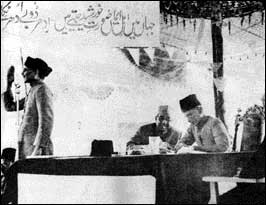
For a long time, the area that is now Pakistan was part of the British Indian Empire. The East India Company started trading in India in the 1600s. They began ruling parts of India after winning the Battle of Plassey in 1757. After the Indian Rebellion of 1857, the British Crown took direct control over much of India.
In 1906, the All-India Muslim League was formed. This group wanted to create a separate Muslim state. The idea for a separate Muslim state in South Asia was first suggested by Allama Iqbal in 1930. Three years later, Chaudhary Rahmat Ali proposed the name "Pakistan." This name came from the first letters of five northern regions: Punjab, Afghania (North-West Frontier Province), Kashmir, Sindh, and Baluchistan.
In the 1940s, the movement for India's independence grew stronger. At the same time, Muslim nationalism also became very strong. The All-India Muslim League, led by Muhammad Ali Jinnah, played a big role. In 1940, the Muslim League formally asked for an independent state for Muslims in the Lahore Resolution.
The Path to Freedom
After World War II, the British government decided it could no longer control India. In 1946, the Indian National Congress wanted a single, united India. However, the All-India Muslim League wanted a separate country for Muslims. This disagreement led to many riots.
In February 1947, British Prime Minister Clement Attlee announced that Britain would grant full independence to India by June 1948. On 3 June 1947, the British government agreed to divide British India into two independent states. These new states would be given "dominion status," meaning they would be self-governing but still linked to the British Commonwealth.
Viceroy Mountbatten chose 15 August as the date for the transfer of power. This was the second anniversary of Japan's surrender in World War II. He chose 14 August for Pakistan's ceremony because he wanted to attend both events.
The Indian Independence Act 1947 was passed by the British Parliament. This act divided British India into two new independent countries: the Dominion of India (which later became Republic of India) and the Dominion of Pakistan (which later became the Islamic Republic of Pakistan). The act also explained how to divide the provinces of Bengal and Punjab, set up the office of the Governor-General, and split shared property.
On 14 August 1947, the new Dominion of Pakistan became independent. Muhammad Ali Jinnah became its first governor general in Karachi. People celebrated widely, but there was also violence and many people had to move because of religious conflicts. Millions of Muslim, Sikh, and Hindu refugees crossed the new borders into Pakistan and India.
Why 14 August?
The Indian Independence Act 1947 actually said that 15 August was the birthday of both Pakistan and India. It stated: "As from the fifteenth day of August, nineteen hundred and forty-seven, two independent Dominions shall be set up in India, to be known respectively as India and Pakistan."
Jinnah himself said in his first speech to the nation: "August 15 is the birthday of the independent and sovereign state of Pakistan." The first postage stamps also showed 15 August 1947 as Independence Day.
However, in later years, 14 August was chosen as Pakistan's Independence Day. This is because Mountbatten gave the independence oath to Jinnah on 14 August. He then left for India, where the oath was scheduled for the midnight of 15 August. Also, the night of 14–15 August 1947 was the 27th of Ramadan in the Islamic calendar. This night, known as Laylat al-Qadr, is considered very holy by Muslims.
Celebrating Independence Day
Independence Day is one of Pakistan's six public holidays. It is celebrated all over the country. Before the day, government officials and leaders hold meetings to plan the celebrations. Schools and government offices organize special events, sports, and cultural activities. In Karachi, the Mazar-e-Quaid (Jinnah Mausoleum) is cleaned and prepared for the celebrations.
Official Events
The official celebrations start in Islamabad. The national flag is raised at the Parliament House and the Presidency. This is followed by a 31-gun salute in the capital and a 21-gun salute in other major cities. The President and Prime Minister give speeches to the nation on TV. Leaders and celebrities also give speeches, talking about Pakistan's achievements and future goals. They also remember the sacrifices of national heroes.
Government buildings like the Parliament House and Supreme Court are decorated with lights. The Armed Forces perform a change of guard ceremony at national monuments. The Army, Air Force, and Navy take part in parades. In cities, the local mayor raises the flag. In 2017, Pakistan International Airlines even had special in-flight music sessions with patriotic songs for passengers.
Leaders from other countries send good wishes to Pakistan. Pakistani embassies around the world also hold flag-raising ceremonies. Pakistani soldiers at the border often exchange sweets with soldiers from neighboring countries. Major roads and monuments are decorated with national flags. The Minar-e-Pakistan in Lahore, where the Pakistan Resolution was passed, is lit up to show its importance.
Public Celebrations
As August begins, special stalls and shops appear everywhere. They sell national flags, decorations, badges, and pictures of national heroes. Cars, homes, and streets are decorated with flags and lights. Businesses also sell special clothes and jewelry for the holiday.
The day starts with special prayers in mosques and other religious places for Pakistan's strength and growth. People attending parades often wear Pakistan's official colors, green and white. Many people visit friends and family, enjoy Pakistani food, and go to parks.
Public events include fireworks, street parades, music and poetry contests, and art shows. The national anthem is sung everywhere. People shout patriotic slogans like Pakistan Zindabad (Long Live Pakistan!). Concerts and dance shows are held both in Pakistan and in other countries. People also remember those who died during the partition and the brave soldiers of the Pakistan Army.
Pakistani communities living abroad also celebrate Independence Day. In many countries, famous buildings are lit up with Pakistan's national colors. Large parades are held in cities like New York, London, and Dubai. Some Kashmiris also celebrate the day, showing their support for Pakistan.
Security Measures
Security is increased across Pakistan as Independence Day gets closer. This is especially true in big cities and sensitive areas. High alert is declared to prevent any security threats. However, there have been a few times when attacks have happened on Independence Day.
In 2010, severe floods affected many people in Pakistan. Because of this disaster, the president announced that there would be no official Independence Day celebrations that year.
See also
 In Spanish: Día de la Independencia de Pakistán para niños
In Spanish: Día de la Independencia de Pakistán para niños


